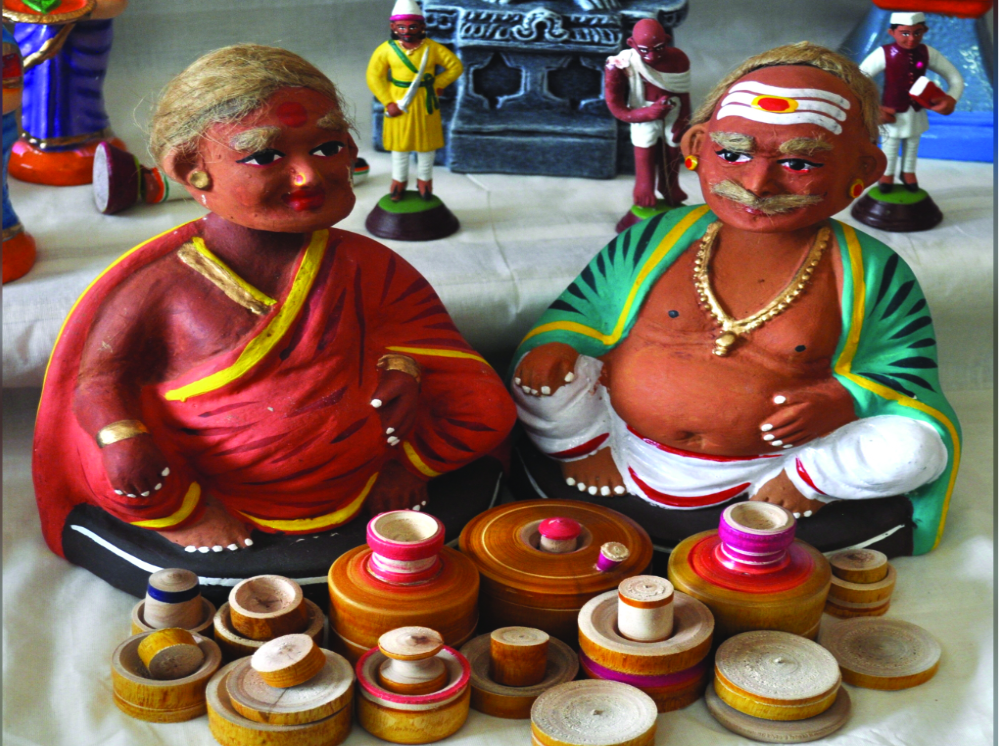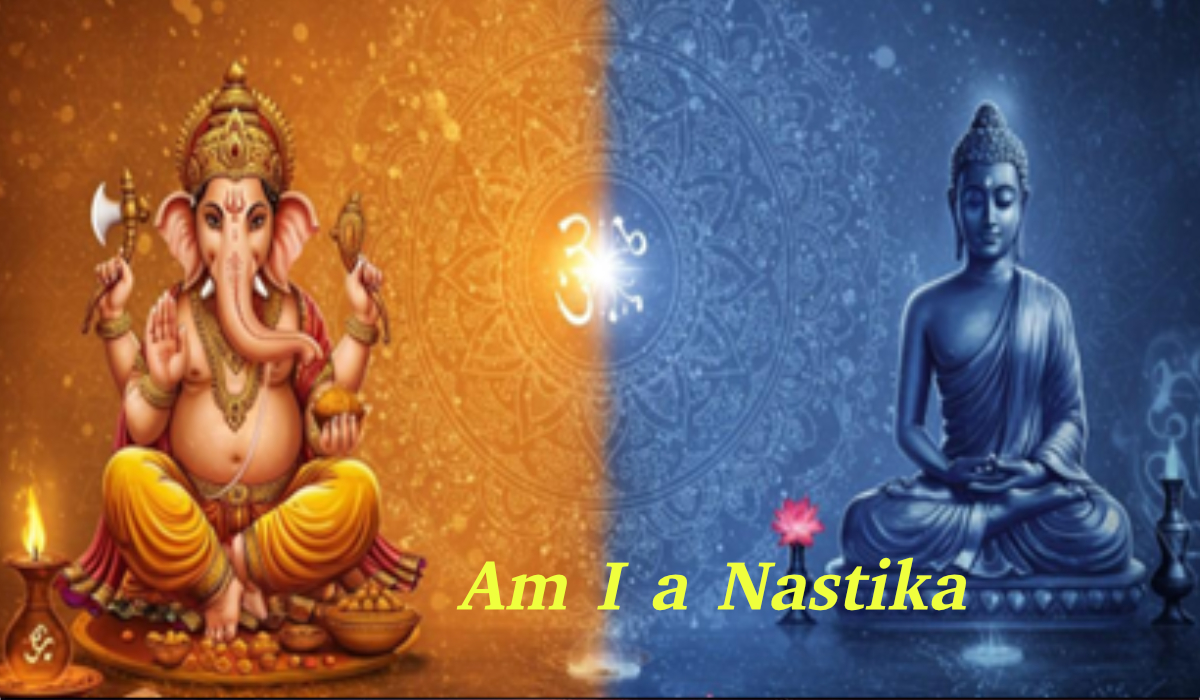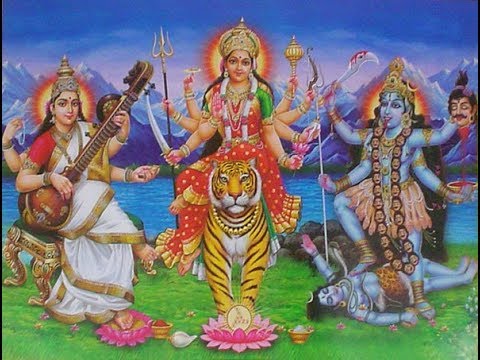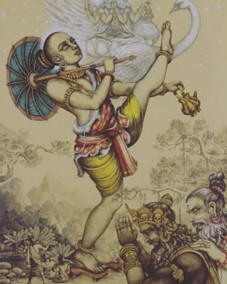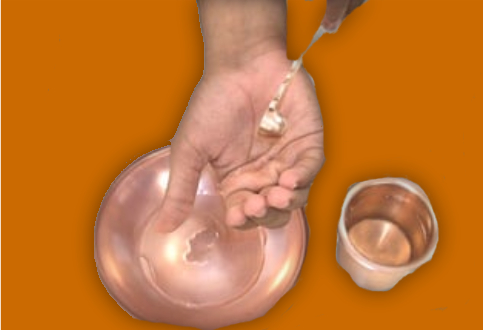38 – Give me, ME
Give me, ME
Conversation With Aiya (38)
“Have you set-up the Kolu-steps?” – Ayya asked.
“Yes, Ayya! That’s why I am bit late”.
I had to explain my ten-minutes late-arrival to Ayya for the scheduled walk with him at 1 pm.
“I use some wooden planks myself and make the Kolu-steps, either five or nine each year! Just that I am a little less motivated these days! But when Navarātri comes, Uma gets more energy and enthusiasm. It is her infectious zeal, that I am able to help setting up the steps every year, Ayya!”
“That’s commendable! Isn’t that a great blessing!”
I thought the same thing.
“But what happens then, not just the labour of setting up the Kolu-steps, there is plenty of tasks as Uma keeps on adding upon pondering – about the gifts to give, places to visit, friends to host, dinner to cook etc., just adding the tension at least a week before the Kolu starts. Uma is super smart to seamlessly transfer her load of stress unto me!”
Ayya laughed.
“You are lucky! It is a great fortune to have the desire to do such auspicious things, year on year! So please do not complain and be supportive.”
“Of course, Ayya! But I think this hospitality and going from house to house are becoming more important than the time spent worshipping Swami! Am I not the one who spends most of the time, driving her around?”
I laid my fatigue bare!
Ayya looked at me intently!
“What is the intent of any worship my friend! Is that not for our happiness! Don’t you see that your wife is happy with these Navarātri events? From what you say, it seems that she is most enthusiastic during Navarātri! Isn’t that a good thing, a healthy environment! That is the benefit of worship, is that not!”
“Surely Ayya! Not just for her, for everyone in the house, Navarātri brings peace of mind and a great zeal… indeed during each festive season!”
“That is the essence of our festivals! You must understand how thoughtful our ‘Sanātana Dharma’ is in guiding us towards peace and happiness with the abundance of sweet excuses in the name of seasonal festivals! Don’t we get the opportunity to completely forget our laden chores and sorrows and come together to enjoy! The festivals are the healing doses to our ailing hearts! Our way of celebrating life is the true art of living!”
“Yes Ayya! Definitely! We should all earnestly celebrate these festivities.”
I said a little shyly.
“My boredom is only superficial, Ayya. I do enjoy!”
“Good! Calling everyone to our homes, going to everyone’s homes, exchanging small gifts out of love, singing devotional songs, celebrating with games and gummi, everything is wonderful. Navarātri alone is the longest festival – lasting for nine-ten days, just for the purpose of relaxed recharging!”
I was listening.
After a few minutes, Ayya continued.
“However, there is a point in what you are saying!”
I thought Ayya was going to say something reassuring to cheer me up.
Maybe he was going to dwell me deep into some more spiritual knowledge that would really make me happy!
I was walking with him without speaking.
“In the midst of celebrations, it is our duty to think deeply about something that we really need to celebrate. I think the Navarātri festival has given us the opportunity to set aside ten days for this very purpose and a chance to meditate.”
“Meditate about what Ayya?”
I continued.
“Amidst the celebrations, there is always some recitation of slokas, singing bhajans and alike! At our home during the Navarātri days, we recite Sri Lailthā Sahasranāmā, a few times.” – I sounded as if I am submitting a report.
“Very good! Recitation and worship are all important! But do you ever think about the meaning of the mantra or the import of the songs that you recite? Only such contemplation becomes an ‘upāsana’. Otherwise, a ritual is a mere ‘karma’, of course, a pious karma! But it does not give complete results!”
“What are you saying, Ayya?”
“The scriptures say ‘karma-upāsana samuccayam’. That is, along with the karmas performed as rituals as prescribed, there must be ‘upāsana’, the deep contemplation on their meaning. That is important.”
“Ayya, how are we to know the meaning of many mantras and hymn? Isn’t it enough to recite or hear those with ‘true-devotion’! Please tell!”
Ayya heartily laughed.
“Don’t argue like that! If only we all know what ‘true devotion’ is, we wouldn’t be having this type of conversation! Come on, it’s perhaps correct that you ask how you may know the meaning of everything! But have you ever tried to find out the meaning of something that you recite! That’s the question! Once you start trying, you will automatically find a way to learn and realize the inner meaning!”
“It’s true, Ayya! I do have thoughts like that to inquire the meaning of such hymns, but not so seriously! There are so many slokas! If I want to know the meaning of each one, won’t it take a long time!”
Saying this, I felt a little embarrassed.
Ayya continued.
“May be! Yet it is enough to start with just one of those, searching for its deep meaning. You will be surprised, That one contemplation alone could reveal everything.”
I was thinking which one would such contemplation be!
Ayya asked.
“Do you chant any sloka seriously?”
“Yes, Ayya, especially during Navarātri, the one always try to recite: a compact, easy to memorize sloka that directly asks for what we all want, Ayya!”
“Very good! What is that?”
“rūpaṃ dehi jayaṃ dehi yaśo dehi dviṣo jahi”
I looked at Ayya.
“Ayya, You were the one who gave me this mantra when you taught me about Shri Devi Mahātmiyam earlier.”
“Yes. That is the Argalā-stotram! It seems you have grasped just one line of it! Good!”
“Yes Ayya! I have always recite this line in my mind; it is my Sankalpa that at least during these days of Navarātri, I must keep reciting in my mind.”
“May that happen! Have you contemplate on this sloka?”
I remained silent.
All I knew was that Ayya was going to sink me into the great depths and then pull me out again, afresh.
“Take just the first two words of this line!” – Ayya said.
“Ayya, Are these words, ‘rūpaṃ dehi’ ?
“Yes! What do these words ask for!”
“It asks Ambāl to give me a good embodiment!”
“Why? Don’t you like your form right now?”
“It is not that Ayya! There is nothing wrong in praying that we should become more beautiful!”
“Sure, there is nothing wrong in asking! But you have to be reasonable. You already have a body! If God needs to grant your request for a more beautiful form, then shouldn’t the God take you to another birth? Is that for your request? Do you want another birth? Don’t you want redemption from the cycle of birth and death?”
“I don’t know, Ayya! Perhaps ‘rūpaṃ dehi’ is the plea for attaining a good health to this embodiment?”
“Then, you should have asked ‘deha ārogyam dehi’ explicitly!”
“I could have done so! But what if ‘deha ārogyam’ is taken to mean one’s mental well-being as well?”
I had just started thinking deep.
Ayya pondered.
“What! Now it seems that you are intending to change the words of the sloka! We have no right to do that except to beseech the deeper and true import of the hymn.”
Ayya continued.
“If you take ‘rūpaṃ’ as your physical form, then clearly, there is little scope in God replacing it in this birth. The current body that you have is an acquired instrument, as the result of your past karma. May be your prayers can bring certain well-being to this gross embodiment but can never give a new one! A new body is a new birth!”
“So, Ayya, what is sought after in this prayer?”
“Let me ask! Do you see your image in the mirror?”
“Of course, Ayya!”
“Is the image that you see as yourself, the same as how others see you?”
“Certainly Ayya! What doubt is there!”
“Well, not so! If someone is looking at you, you have no idea how they perceive you!”
“Why so Ayya!”
“It is because each person’s perception is always based on the impression that the person has made on the object of perception! How others see you depends on how the other person perceives you!”
“I understand Ayya! Sometimes, rather than looking at the clothes and jewellery my wife is wearing, I look at the thought of what she has come to ask! That is why, many times, I have been scolded for not commenting on her makeup.”
Ayya laughed.
“Yes! Like God, each of us is a creator! We create certain impressions in our minds with our thoughts and see the world with that filter. So our visions are always biased. That is why it is wrong to say others see your form as you see your form!”
“I understand Ayya!”
“Then by praying ‘rūpaṃ dehi’, you can say to God, ‘O God, show my loving, sweet, and beneficial form to everyone who sees me’!”
“Yes Ayya! That would be the meaning. It is right that my form should be accepted by everyone as good and loving! Is this really possible!”
“Of course! To grant that plea, there is no need to effect change in your physical body, don’t you agree! Your character, your words, and your behaviour – these must change! Your attitude towards each relationship must become pious and good! Therefore the result of the prayer ‘rūpaṃ dehi’ is the resulting change within yourself! Do you see!”
“Yes sir! This is a good indeed! But then, can I not bring such changes within myself? Why is there a need to pray to God for this!”
Ayya seemed to look at me with a surprise.
“Wonderful! This is what I expected from you! What is the point of imposing on God what we should try and achieve by ourselves? So you are right! Thanks that our little contemplation of these words has given us the knowledge that we have to bring about good changes within ourselves, that is the good result!”
“That means, there is no need for us to say these plea: ‘rūpaṃ dehi’ – Is that correct?”
“We don’t have the authority to decide that, but only the right to seek a deeper meaning for that prayer, perhaps the duty!”
I waited.
“If something like that to happen that which we cannot make it happen by our effort alone, if only God’s grace can help us in that pursuit, then that which we seek must be a great blessing, isn’t it?”
“Yes, Ayya! What is it?”
“That’s what you really do not know! That’s what you can’t know!”
“Ayya! I don’t know many things which I am happy to accept. But if you say that it cannot be known, then how can that be, Ayya! For example, if you tell me what that is then I can know that. I will know that.”
“No, That can be revealed in words.”
“Okay, don’t say that with your words. Instead, show that for me to see!”
“It’s unshowable! It’s unsayable!”
“What is this Ayya! Are you talking about God? Yes, God is invisible to the eye no matter how much we worship Him? Yet don’t all Vedas talk about God that we don’t see!”
“God is always in front of our eyes. He is everywhere and He is everything. Out of ignorance, we don’t see Him but beseech His presence in some divine form or at divine place. There is nothing wrong with that worship! Even though milk is everywhere in the body of a cow, we only get it from its udder! Similarly, there is nothing wrong with the seeing of God in the forms at the temples. The point is that we already have a form, nay many forms, of God. So the plea ‘rūpaṃ dehi’ is not about such forms of God!”
“Then what is that form that cannot be seen, Ayya!”
“That is You! The One who sees everything!”
“Is it Me? I do see myself in the mirror! I am seeable, showable., am I not?”
“What do you call what you see in the mirror?”
“I am!”
“Is that really you?”
“Well, to be precise, it is my reflection. My body.”
“That means, You are the Seer and you see your body!”
“Yes!”
“Then what is your form – the One who sees?”
“Hmm… perhaps my mind?”
“How? If you say ‘my mind’, isn’t the mind your property, just like as you say ‘my house’ or ‘my hand’?”
“Yes, my mind is, like my body, my embodiment.”
“Yes! Mind is not you but belongs to you. You can see your mind, with all its vacillating thoughts. So is your intellect as you can see both your knowledge and ignorance in it. Therefore, you are neither your mind nor your intellect!”
“Then who am I?”
Ayya laughed loudly!
“Thank God! Finally, you have popped up the simplest of all questions! ‘who am I’; I wish I could tell you! No one can answer this but you, with the grace of God! That is why we pray to God with the plea: ‘rūpaṃ dehi’.”
“So what is the purport of ‘rūpaṃ’ in this context?”
“Here ‘rūpaṃ’ refers to your true nature, ‘svarūpaṃ’! That is the revelation to the question you finally popped: Who am I?”
“Ayya, will I get this answer?”
“Of course!”, Ayya laughed and said.
“For these ten days of Navarātri, may you just contemplate upon this question. Just as a dream comes and goes, so too will the superior knowledge of the ‘svarūpaṃ’ will come and go!”
“What! If such ‘jnānam’ comes, then why it has to go? It should not go! It should remain with me as my jnānam!”
Ayya paused for a while and said.
“If you see it as ‘my jnānam’ as a possession of yours, then like all possessions, it will also go away!”
“Then what is that jnānam?”
“Know that jnānam as your true form! Upon that realization, that jnānam remains eternal.”
“Even if I die?”
“There is no death for the real you! After destroying the ‘my thought of I’, where is destruction. ‘I’ don’t die!”
He laughed.
“Go, Uma will be waiting!”
Saying thus, he was walking in his direction.
I sat down, feeling fulfilled, on the bench nearby, recollecting how once before, I had a
Mee. Rajagopalan
21 Sep 2025
